#OPEN THE GATES AND STAB THAT THING IN THE EYE LET’S GO EGG! SO PROUD OF YOU!
Text

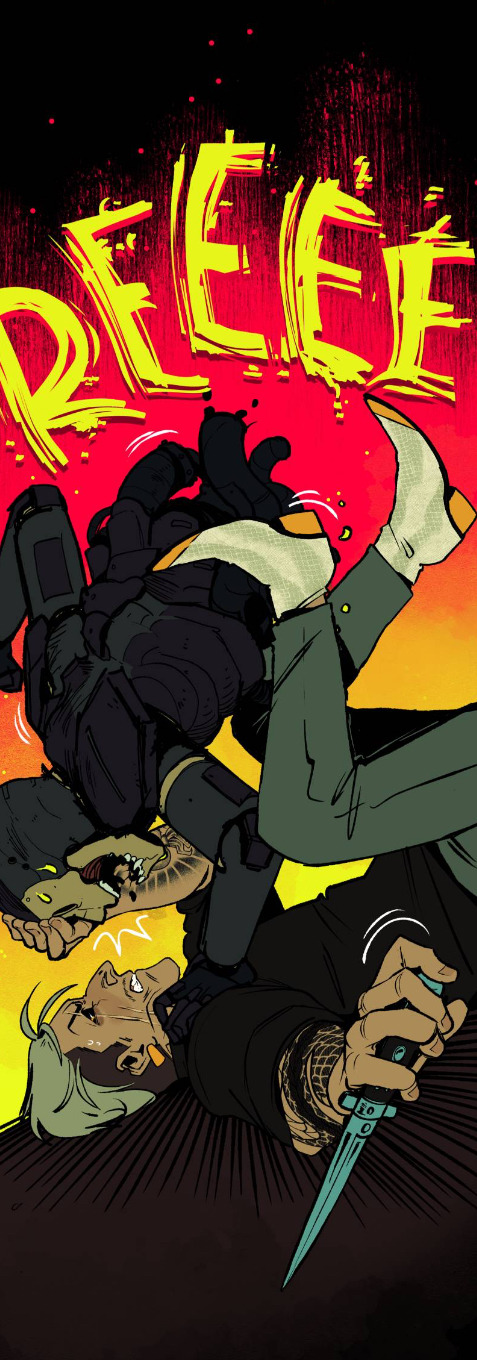

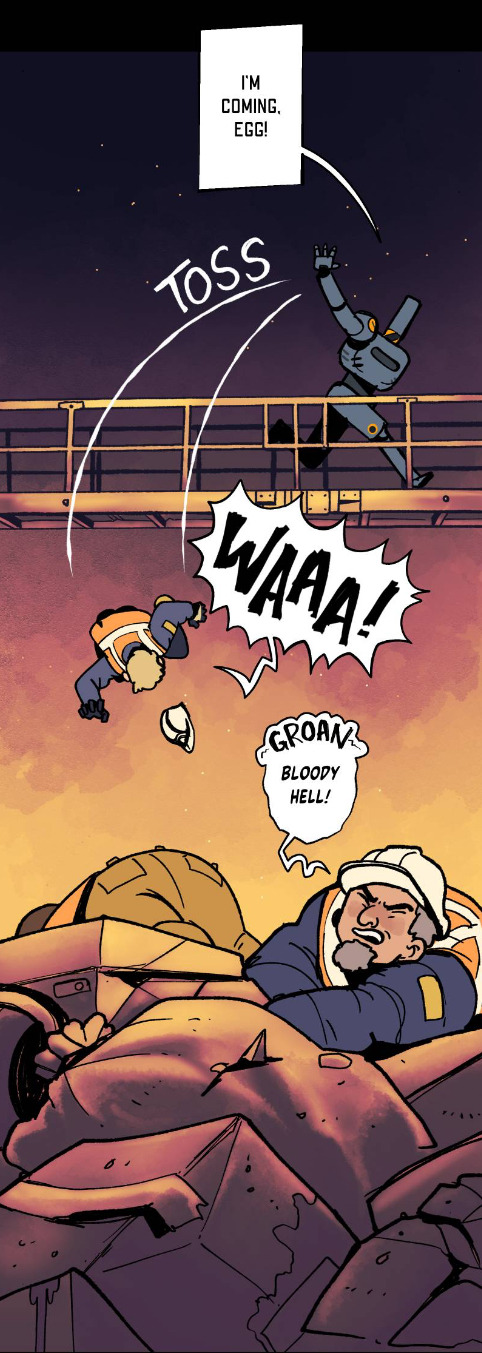

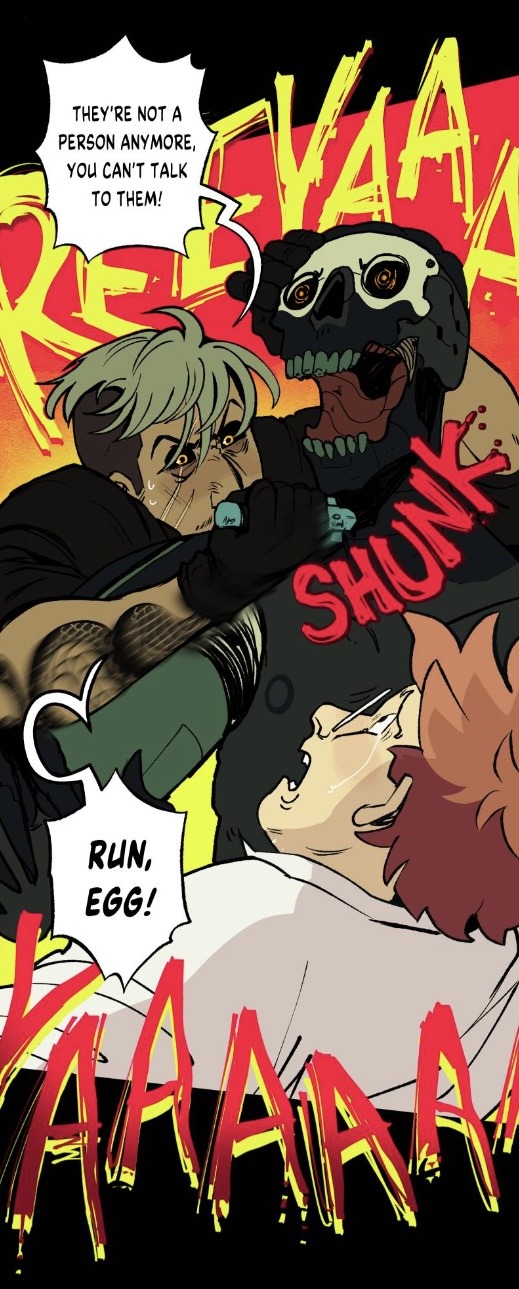





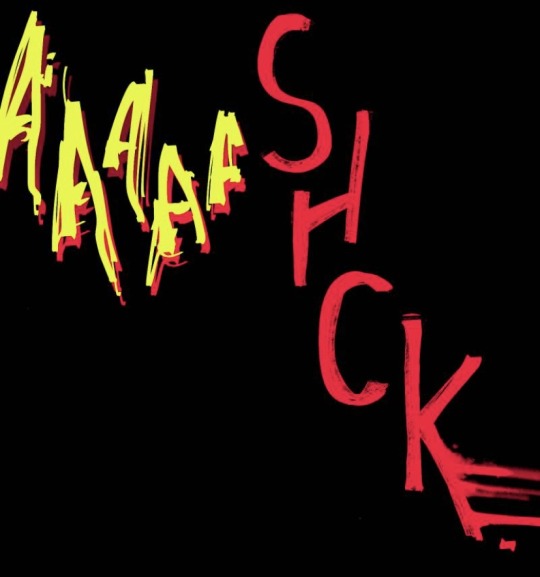


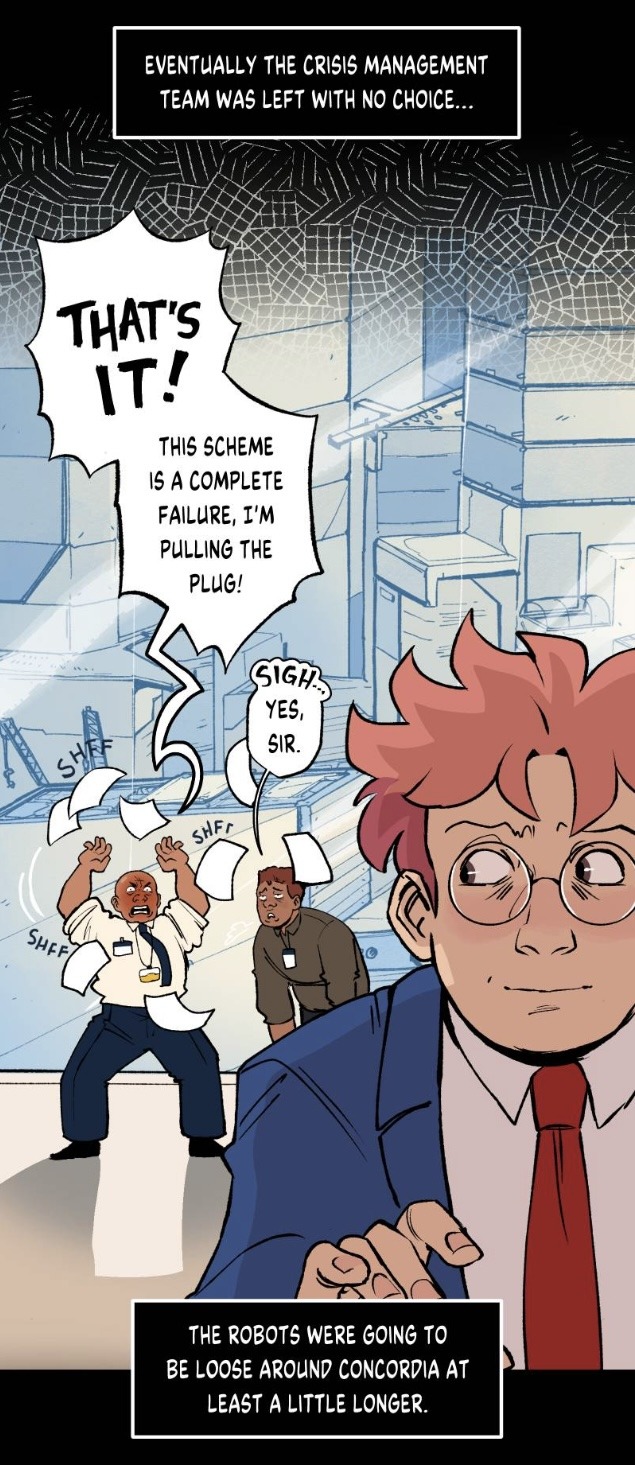



EGG 💙💀🙌🏼🥺❤️
#Solid State#Solid State Webtoon#Webtoon#WOW ANOTHER GLORIOUS CHAPTER COMPLETED THAT WAS AMAZING#EVEN TWO EPS SHORTER IT DELIVERED EVEN MORE LIKE WOW#ANYWAY THE CHAPTER UHHHH NO CYBORG DON’T KILL EGG PLZZZZZZZ#THE BLOOD ON ITS HANDS AAAAAAAAAA#GOOD JOB ENZO I WASN’T SURE IF YOU’D GET UR KNIFE BACK BUT GOOD#YES ICO GO SAVE EGG IT DON’T MATTER WHAT THE WORKERS ARE TELLING YOU#AAAAAAAAAAAAAAA STOP CHOKING EGG PLZ RIGHT NOW I SWEAR#LOOK AT HOW SAD HE LOOKS WHY WOULD YOU DO THIS TO HIMMMM#THANKS FOR SAVING HIM ENZO#THOSE PANELS OF EGAN TELLING HIMSELF TO RUN ARE SO GOOD WITH THE COLORS AND EXPRESSIONS LIKE GAHHH#“You! Strange Unsettling Man what did you do with Egg?” HAHAHA ENZO IS STRANGE UNSETTLING MAN HA#OPEN THE GATES AND STAB THAT THING IN THE EYE LET’S GO EGG! SO PROUD OF YOU!#Oof Enzo you good buddy#A HAPPY ENDING TO A CHAPTER FOR ONCE OMG NOT LIKE THE DEVASTATION OF TAKEOVER AND THE GRIEF OF SURGE YAYYYY#WOW THEY KEEP MALFUNCTIONING I WONDER WHYYYYYYY Did Surge doctor man even come back to work#The colors of the lower city in the rain I can’t! Look at those purples and blues!!!#THOMMO AND BEAU! SO GLAD THEY’RE GOOD FRIENDS OMG#ICOOOOOOO BBY HIIIII#THAT ENDING SHOT IS SO WHOLESOME IT LOOKS LIKE THE VIDEO GAME STRAY#BUBBLY TITLE ART AGAIN CHAPTER WAS SO GOOD THANKS SO MUCH PANELPERDAY AND VELDENMIRE LOOKING SO VERY FORWARD TO THE MIDSEASON FINALE#AND THE REST OF THE SEASON AT LARGE!#Also expect another post compiling details again next week bc there’s STILL STUFF I MISSED GAH#It’ll be redundant with the other one bc I didn’t know we were at this natural ending point then and I wanna just compile everything#So yeah see y’all next week for the MIDSEASON FINALE AAAAAAAAAAAAAAAA
1 note
·
View note
Text
The Edge of Acceptable

Hello friends! Previously I said I would try and post an article between then and my "Doctor Who: The Edge of Time," review. This was mostly due to my not knowing how long it would take me to finish playing the game. Well, intrepid reader, it appears I overestimated the game's length, as I have beaten it and I have many things to say. Before we begin, however, I would like to state that this review will be full of spoilers, so if you plan on playing "The Edge of Time," for yourself, you may want to hold off reading this. There, you've been warned. Let the spoilers commence!
The game begins in a laundrette somewhere in a dark corner of London. After some strange anomalies, a television kicks on, and the Doctor, played by Jodie Whittaker can be seen on screen. Speaking directly to you, she tells you that you're the only person that can help her. Suddenly a shift in the lights (and possibly time) occurs and the laundrette is filled with a black sludge reminiscent of the purple gunk from "The Legend of Zelda: Breath of the Wild." Peering from the individual dryers along the wall are black sludge monsters with murky red eyes that stick to you. If you get close to them, they lunge and crack the glass.
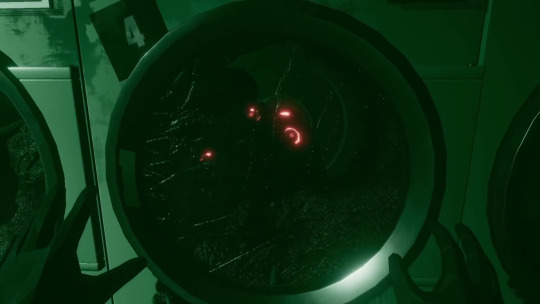
After explaining to you that the universe is like a hard drive and that people and moments are like individual files, the Doctor informs you that someone has installed a sort of computer virus. Lost on the edge of time, she is unable to help you, but using a bit of her Doctory magic, she's going to help you help her, and by extension- save the universe. It's no small order, but you're raring to go!
It's during this point, however, that I did find myself slightly frustrated with the game design. As the Doctor begins speaking to you, she's oftentimes drowned out by the music, making it hard to hear what she's saying. When I went to the options menu, I was surprised to see that no option to lower the music volume was available. There was however a subtitles option, which I opted out of due to my feeling that seeing subtitles somewhat sullied the immersion. The next bit of frustration came from the following scene in the back office of the laundrette.
Another big source of frustration was the controls. While in the office, you're made to find the code to a safe, and then enter the code into its keypad. As excited as I was to be playing a new Doctor Who game, I almost rage quit due to the sheer difficulty of entering a simple four-digit code. Now, it's worth mentioning that at this point, I was still using my Playstation controller. After switching to the Playstation Move controllers, my experience improved exponentially. However, even with these Move controllers, performing minute actions felt a lot like trying to unwrap a lemon sherbet while wearing a pair of woolly mittens.

You learn a little bit about the late owner of the laundrette. He used to be a janitor at Coal Hill School, and he's now a pile of ash on a chair. The books strewn about the office show he was a man interested in strange phenomena dealing with time and space. The Doctor, using a bit of Time Lord magic, has stashed her sonic screwdriver away in the safe. After fishing it out, I took great glee pointing it at literally anything I could. Sadly, the sonic has very little actual interactivity with the surrounding world other than pre-scripted actions like opening doors that carry the story to the next stage.
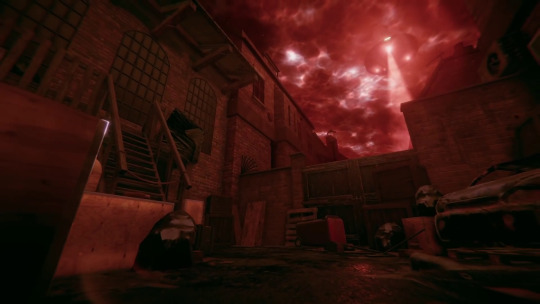
Once outside, you get your first glimpse at a Dalek saucer, floating above the sky like something from the Dalek Invasion of Earth. It's a great little callback, and the alley conjures images of Totter's Lane. After building a signal booster with junk from the alley, you call the TARDIS to your location, where it materialises like the beautiful Ghost Monument we all love. Now, I'm not too proud to admit it, but as I walked into the TARDIS for the first time, I got a little misty-eyed. It really does feel like you're walking aboard the greatest ship in the universe. The people at Maze Theory did a fantastic job rendering the Thirteenth Doctor's TARDIS interior. And yes, the console does dispense custard creams. Trying to make my boyfriend laugh, I held the biscuit to my mouth and was pleasantly surprised when my virtual character actually ate it!
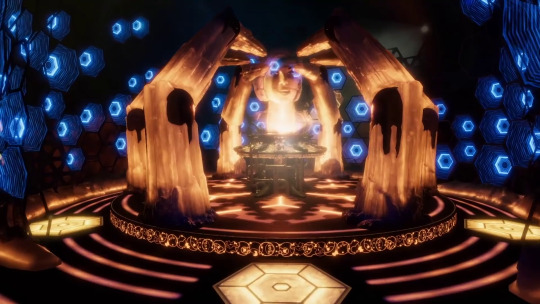
This joy was short-lived, however, because I was once again at the mercy of needing to perform exacting tasks with rather sloppy controls. What should have been a joy (piloting the TARDIS), was instead another rage quit moment. Really though, this is more of a problem native to virtual reality. You're only ever as good as your tools, and Move Controllers aren't hands. Controls are one of the game's biggest flaws, really. For instance- there is no duck or crouch function. Meaning that despite all of the wonderful little Easter eggs peppered throughout the game, the second you drop one on the floor, it's gone forever.
After being recruited by the Doctor, you're treated to a title sequence in full 3-D glory. Let me tell you, the time vortex has never looked cooler. I was like David Bowman entering the Star Gate. Moments like these are when the VR really shines. Afterwards, the first place you land is sort of a head-scratcher. You arrive on what looks like a planet, where you're being stalked by a creepy race of aliens known as Hydrorks. I was slightly sad that you never have to actually worry about them. They're mainly there to scurry about in the shadows. Despite the warnings of a woman you're speaking to over a holo-pad, they don't ever actually attack you. You can stop right in front of them and shine your torch at them and walk away unscathed.
If you recall from my Doctor Who and Video Games article, I complained that one of the biggest issues Doctor Who games have is puzzles. This chapter of the game has the most egregious of the puzzles and had me worried that it was about to devolve once more into a series of irritating puzzles, but they lessen as the game progresses, much to its benefit. I would like to mention though, that the game does take accessibility into consideration. Puzzles involving colours also incorporate shapes for those that are colour blind. You can also switch between hands with your sonic screwdriver, a fact that I, as a left-handed person, wish I would have discovered far earlier in the game.
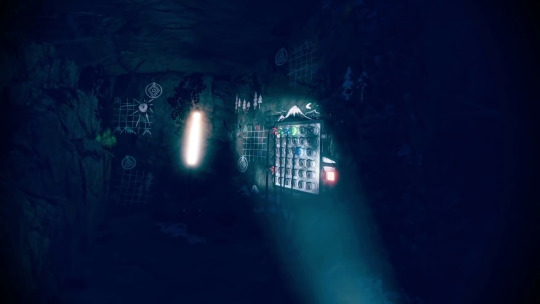
After getting to the lift, you discover the planet you're on is a sort of space ship. The effect of leaving what seems like the outdoors only to find a giant window overlooking alien planets was like something David Lynch would do. I was reminded of episode three from "Twin Peaks the Return," when Dale Cooper exits a room in a building surrounded by a vast purple sea, only to find himself climbing out of a boxy spaceship surrounded by a network of stars. This kind of otherworldly experience is yet again another strength of VR. After a series of puzzles involving lasers, you meet Emer, the ship's computer that forgot it was a computer. Remember how I mentioned David Bowman earlier? Well, the "2001: A Space Odyssey," vibes don't stop there, as Emer's interface looks a lot like HAL 9000. It's a great little homage.
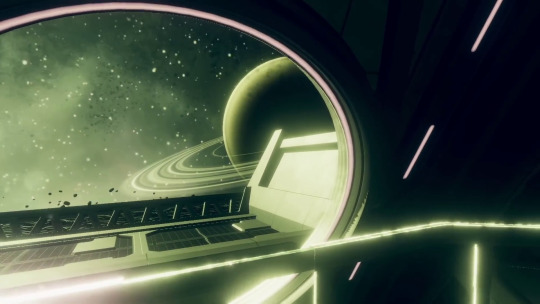
Before leaving the ship, you save Emer onto the sonic screwdriver and find yourself a time crystal. The time crystals are artefacts the Doctor needs you to collect to save the universe. It's a little vague in that "It's a video game, so just go get the thing," kind of manner. But it's a video game, so I'm not even bothered by it. After arriving back on the TARDIS, the Doctor uploads Emer into your brain. Emer's job is to help you along with little hints here and there. I was a little disappointed because the only reason I can imagine they did this is because they only had Jodie Whittaker for six hours on the day she recorded her dialogue. Having the Doctor speak to you like her closest friend is a rapturous bit of nerd joy, so replacing her for a bit is regrettable. But Emer is a likeable character so you don't really mind. The only time Emer really gets under your skin is when she's dropping hints repetitively. You may know exactly how to solve a puzzle, but the mechanics aren't as spelled out. Having her tell you what you already know, over and over again begins to grate on you.
The next place you visit is a very shabby looking Victorian London. You know right away that you've entered Weeping Angel territory. However, the classic Who fans will love the fact that part of this portion of the story incorporates Magnus Greel's time cabinet from "The Talons of Weng-Chiang!" I could tell the people at Maze Theory threw this in for the nerds out there. The Weeping Angels portion of this chapter is easily the creepiest moment in the game. There's a jump scare that had me jumping out of my skin. For full immersion, headphones are a requirement as the sound design is full of little creaks, groans, and stabs as the Angels make their way toward you. The incorporation of the cherubs (which you never see) and a baby pram only adds to the nightmare fuel.
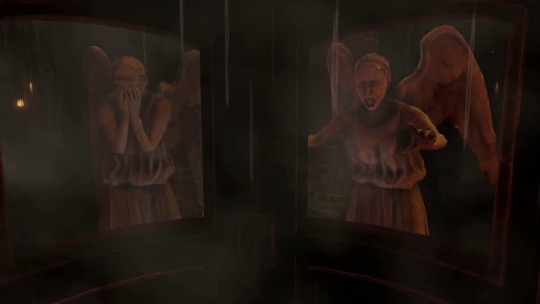
This isn't to say that this sequence is without criticism. One of my chief complaints is that it's a very repetitive sequence. Once you do the first portion, you know exactly how to do the next portion. It then becomes a waiting game which is more tedious than tense. If they'd had varied up the gameplay in this section, I would have said it was the best part of the game. Instead, the Angels only play a minor part, and once you know how to beat them, their terror factor plummets. After a while, the worst part of getting caught by an Angel isn't the dying, it's the waiting for the level to reload. Even with my PS4 Pro, the loading times are egregious. Expect to spend a lot of time staring at the floating orange embers that are the loading screen. At least you can fiddle with the sonic screwdriver while you wait.
After receiving the next time crystal from Magnus Greel's time cabinet, it's time to move on to the next phase. The Doctor begins to tell you a little more about who is tearing apart reality- an entity known simply as The First... or the One. I honestly can't remember which, and the internet isn't much help. It's not a very memorable name, much like the title of the game itself. This "First One," is the very first form of consciousness in the universe that has awoken to find her creation of other forms of life is a disappointment to her. Our penchant for death and destruction has lead her to believe that the only course of action is to reboot the universe, hence the reality virus.
Our next stop is Metebelis...Four? I would be lying if I said I wasn't massively relieved to discover they weren't sending us to Metebelis III. That would have been cruel and unusual. When arriving at Metebelis IV, you're greeted with a gigantic temple structure. In VR, its size and design are really grand in scope. I was reminded of my visit to Durham Cathedral with its impressively high vaulted ceilings. After a quick time jump, you find yourself in a point in history where the Daleks have taken over the planet. I really enjoyed the music cues in this part, because you knew right away you were about to encounter Daleks. You can almost hear a digitised version of their voices in the score that really sets the tone.
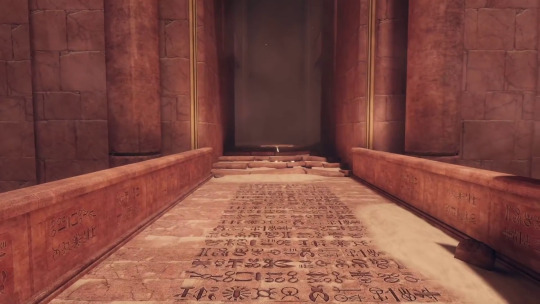
This portion of the game was probably my favourite. A lot of it is sneaky stealth missions, which gradually increase in difficulty. The only problem with the stealth portion is you really need to bait the Daleks into following you at points. It goes against usual stealth mechanics which at this point are generally universal. When you accompany this with long load screens, and Emer repeatedly telling you what you already know, it gets to be a bit much. But getting to drive around as a Dalek later on in the level makes up for this in spades.
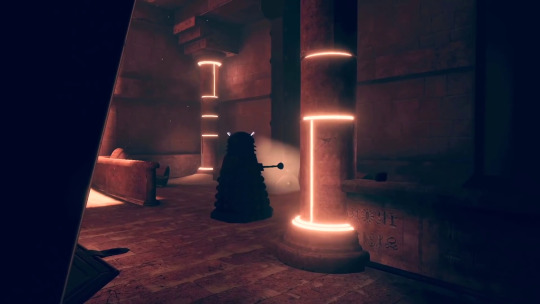
Much like the Weeping Angels portion of the game, the key to beating this section is patience. You can systematically work your way through the level by budgeting your time. If you take out drones and Daleks in the right order, it's a piece of cake. It becomes a memory game at that point. That being said, I still had a lot of fun. Dalek vision was especially cool. After tearing ass through various temples, you find yourself sort of outside of time. The reality virus has almost torn the universe apart but using memories of the places you've been, you're able to hold things together long enough to stop the First One. The Doctor congratulates you and tells you what a star you are. Emer is given human form for her efforts. The TARDIS drops you off back at the laundrette, seemingly to do it all over again, which leads to my biggest question about the game. Am I supposed to play it again, or was that just a meta-joke from the designers encouraging you to replay at your own leisure? Furthermore, is the Doctor not also now stuck in a time loop along with the player?
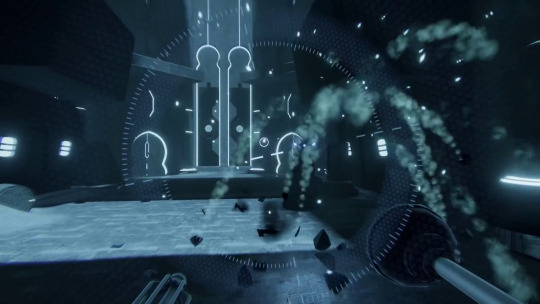
I've not done a second playthrough, so I can't rightly say if it adds more content to the game. I'm going to bet the answer is probably no. This is a shame because for a game that has been marketed for as long as it was, and had its release date pushed back almost two months, it's surprisingly sparse. At the very beginning in the Laundrette, the Doctor mentions both the Stenza and the Zygons, which made me expect to see at least one of them throughout the game. What turned the laundrette owner into a pile of soot? Hell, you don't even see the sludge monsters from the laundrette again. I expected them to be a far bigger problem than they were. The game is surprisingly devoid of other characters. Perhaps this is a symptom of VR, but disembodied voices, static Angels, skittering background aliens, and rail driving Daleks are the most interactivity you'll have with other characters.
Throughout its runtime, I couldn't shake the feeling that "The Edge of Time," was originally supposed to be a much bigger game. While I'm aware that most VR games are generally shorter in length, this feels truncated. Perhaps it was from budget issues or internal problems, I can't say. But is it twenty quid's worth of video game? I would say that maybe with DLC it would be, but as is, it feels incomplete. The ability to select chapters does increase replay value. I could see myself pulling up the Weeping Angels level for a group of friends. However, due to the lack of variety in said level, I don't see the novelty lasting long. If they were to release a couple extra levels that were more like survival horror where you were in a creepy mansion avoiding Angels, or maybe something with Cybermen or Zygons I could see the value increasing. I wouldn't want to pay more for these levels, mind.
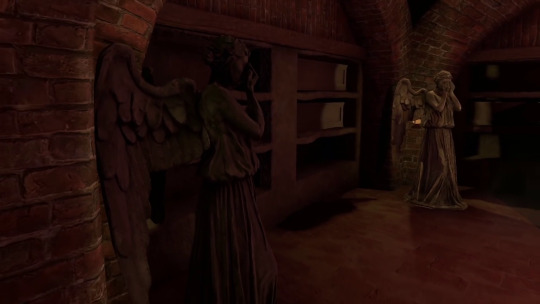
Compare the price of this game to going to a movie with friends. These days £20 will buy you maybe two tickets to see a film. The game is basically a feature-length episode of Doctor Who. So if my boyfriend plays the game, and my wife and friends, then sure, it's paid for itself. But for people who might play this game alone, they may want to wait until the price drops a bit. I had a good time playing the game, myself, but I have to temper that response with the fact that I am a massive Whovian. Will it have the same appeal for casual fans of Doctor Who? That's really the big question, isn't it?
When the game was announced, my first reaction was to shake my head at the BBC's inability to make a proper Doctor Who game. As you may recall from my article on Doctor Who games, this stems from the fact that going with VR was pre-emptively cutting off a large portion of gamers. While there is a very real demand for Doctor Who video games, VR is still a niche market. Not everyone is going to buy VR just to play one game as I did. And even if they are, VR systems aren't cheap. I had to purchase mine on credit. The cost of admission is now much higher than the asking price of twenty pounds. That being said, the game manages to prove that Doctor Who video games can still try new things. The formula and gameplay are very close to what a lot of people have wanted for years. While I still don't feel like we've seen a truly great Doctor Who game, I had a lot of fun with this one.
#doctor who#the edge of time#video game#vr#virtual reality#dalek#daleks#weeping angels#thirteeth doctor#Jodie Whittaker#maze theory#playstation#psvr#bbc#tardis#Sonic Screwdriver#Time and Time Again#metebelis 3#magnus greel#emer#doctor who video games
2 notes
·
View notes
Text
Taking Root
When a plant is pulled from the earth, their tie to life is not immediately severed. It is possible to keep them breathing for just a while longer, but only if they are nursed and cherished until they decide to take root in a new pot of soil. Take for example, the food scraps that cluttered my balcony floor. Various bulbs and root ends from my kitchen lived in plastic containers with jagged holes poked through the bottom, nestled in store-bought soil and haphazardly watered every now and then. The constant squatting was a chore, so I always gave them a quick sprinkle of tap water and prayed for stray drizzles of rain to finish the job for me. This hasty behaviour killed my parsley sprouts within a week. I never tried growing them again after that.
I must confess, this hobby wasn’t born from a compulsion to go green and save the earth. I started growing these discarded parts solely to fulfil my itching need to be some sort of a God, to be able to take control over something amidst the intractable pandemic. I yearned to watch something grow, something animate yet helpless enough for me to force my love onto. This desire had once grown so strong that I was tempted to kidnap unsuspecting snails who slithered out on rainy days. Fortunately for the innocent creatures, I never mustered the courage to pluck one off the damp cement. I had considered adopting other palm-sized animals such as terrapins or hamsters, but their prospective deaths swayed me from the idea of getting too attached to anything considerably cute. So, I thought: why not try to revive a dead thing instead? My first pet was a head of garlic whose sprouts grew monstrously fast and gave a pleasant aroma when stir fried with scrambled eggs and fish sauce. Spring onions came next, followed by some mint, ginger, and parsley. Over time, my army of resurrected supermarket veggies inhabited the right-most corner of our balcony – the only place in our house where direct sunlight could reach us. It was, unfortunately, also the space my retired father always occupied, peeping into neighbouring blocks and smoking his Camel cigarettes. I could sense his frustration every time he tiptoed through my plants to get to his usual spot, but he never asked for them to be moved. Mint leaves would tickle his feet as he puffed away, hunching over the railings and forcing every noxious cloud outwards and away from our living room. Sometimes I did pity the old man to see him compete with the puny sprouts for sunlight, but I told myself that if it were truly a problem, he would speak to me about it. He never did. At times I caught him peering down at the containers, looking for mosquito larvae to evict or perhaps devising a plan to murder them all in a feat to regain his territory. I had heard, on multiple occasions, the “accidental” kick of a pot followed by an exaggerated tsk and the cracking of knees as my father bent down to inspect for damage. I would hear him mumbling incoherently to himself afterwards, probably cursing at my scraps for being too stubborn to die. That’s just how we lived as adults – my father and I trudging around conflict because the two of us would rather simmer in mild annoyance than confront each other about our feelings.
Everything changed one night when a parcel arrived at our house. I didn’t think much about it as we would receive at least one parcel each week, all with the same cardboard packaging with the sender’s address printed in Chinese.
“So late then come,” my father complained as he hobbled to the door while the bell endlessly rang. He was proud of his latest installation: a doorbell that chimed a shrilly, robotic jingle of “Auld Lang Syne”, reminiscent of the nasally sounds emitted from battery-operated lanterns children play with during the Mid-Autumn Festival. My father hacked the doorbell to make sure the piercing tune did not stop until the front door was opened. It was his solution to rid my habit of pretending not to hear the bell in hopes of him answering the door first. His crazy idea worked because I hated that song, and he bloody loved it. So, it was a surprise to see him reach the door before I even planted my feet on the ground. I watched from the sofa as he signed the delivery order and dragged the oblong package to the living room. He bent forwards and the box slipped from his fingertips, landing on the tiles with a chilling clank. The smell of tobacco smoke wafted from his silver hair, irritating my nostrils.
“Girl, open for me,” he said. Leaving the parcel at my feet, he went to the kitchen to pour himself a cold drink, as if the mere act of hauling the box ten steps from the gate had rendered him parched.
“My penknife is behind the TV.”
With my eyes glued back at the screen, I forced myself off the sofa and shoved the package aside with my toes, airing my unhappiness to my offbeat father whose online shopping habits were getting out of hand. I thought I had done myself a favour by showing him how to shop for his own products online, but it disgracefully spiralled into an obsession for cheap junk. He’d always make me open the larger packages due to his bad back, and who was I to refuse a droopy old man?
With my armpit pressed against the warm TV, I reached over the screen and blindly swivelled my wrists until my thumb hit the side of his open-faced toolbox. I plunged my hand in and wiggled my fingers around, frantically searching for the blade before my armpit hairs singed off. After wading through three pairs of scissors, a screwdriver, a large tape measure and a hairbrush, I finally got a grip on the penknife. I pulled it out and was startled to see its rusty blade still drawn.
I dropped to my knees and examined the parcel as my father returned from the kitchen, soft drink in one hand and the other resting on his hip. A drop of condensation from his cup landed on the box and left a dark spot, as if telling me to hurry up.
He cleared the fizz from his throat as I pushed the blade through a layer of tape in one smooth swipe. I wondered if he remembered the time when I was nine and had slashed my palms open trying to pull the lid off a can of longans. I had planned to make him an after-dinner dessert, but it bitterly ended with a night at the hospital with him holding my right hand as the doctor stitched up my left. The package in front of me now brushed against the scar on my palm as I reminded myself to strike the knife away from me and not towards.
“Be careful,” said my father. I wasn’t sure if he was worried for me or for the contents of his box. After slicing through the rest of the tape, I opened the flaps and out sprang thick layers of bubble wrap. I sunk my fingers into the plastic sheets and yanked out a lengthy mass of what felt like dense metal rods. Picking up the penknife again, I stabbed through the bubble wrap and ripped the layers apart, fuming with a mixture of curiosity and restlessness to find out what idiotic appliance I had to live with this time.
“Not bad, looks just like the picture.”
My father’s satisfaction grew as I hoisted a massive iron structure from the shreds of packaging around my thighs. It was a large cuboid frame that glistened under our ceiling lights. No wonder it weighed a ton; This thing was a chunk of pure metal. I stared at the puzzling object, frowning.
“It’s a rack, girl. For your plants.”
The realization that this package was for me took a while to sink in. It wasn’t my birthday, nor had I received any special promotion at work. There was absolutely no reason for this gift. My father had stopped thinking about presents years ago, ever since I turned thirteen and came home with my first pack of sanitary pads. “I don’t know what teenage girls want anymore,” he had reasoned. Every birthday after that simply involved a quiet dinner of delivery pizza and a red packet left on my desk. I was always grateful for the money and for the freedom to choose whatever I wanted for my special day, but as I grew older, I couldn’t shake the feeling that perhaps my father had stopped noticing me. Whatever I liked or disliked did not concern him anymore, and the red packet was just an obligatory act for the occasion. The thing is, you can give anybody money, but gifting somebody a surprise is undeniable proof that you had been lingering in their heads for a while.
The present in my hands grew heavier. I suddenly felt bad for kicking it earlier with my feet. I didn’t dare look up at my father, but I imagined his face beaming with triumph that he had finally purchased something I couldn’t possibly frown at. Still, I refused to give in. My body, however, could not stay composed. Goosebumps rose along both arms as the cold metal pressed against my blushing skin. I quickly set the rack down beside me and studied it in its entirety. Its gridded base resembled a charred barbecue rack, designed for letting excess water drip through in case of careless over-watering. A decorative grill bordered the rack with curls that forged subtle heart shapes, forming a fence of dainty swirls that enclosed its contents with the illusion of tenderness. It was, I hated to admit, surprisingly beautiful. But the most essential piece to the contraption was yet to be revealed. While I was mesmerized by my new gift, my father tilted the box and poured out two large brackets along with a couple of nuts and bolts.
“Come, I hang for you.”
Despite his dry, peeling hands, my father could always fix anything up in a jiffy. He fastened the loose brackets onto the iron rack, transported it to the balcony (after staggering through my scraps) and hooked it onto the railing. It dangled precariously at waist-level before my father tightened the remaining bolts. He then proceeded to give it a few smacks and thumps to test the rack’s stability. It didn’t budge. My father turned around, grinning.
“Better now, right?”
I joined my father on the balcony. Without a word, we picked up my containers one by one and settled them within the heart-shaped walls of the flowerpot holder. Our knuckles bumped carelessly against each other, and I was suddenly sent twenty years back to a balmy day at the beach. Knees bent in the warm sand together, my father and I were building our kingdom. He constructed elegant castles complete with battle towers and windows, patiently carving them with plastic utensils we found littered along the shore. While he sculpted the fancy parts, I helped decorate the walls with broken seashells and colourful bits of trash. The icing on our cake was a glistening green flag: A piece of skewered seaweed hanging limply on a twig. My least favourite part of the fortress was always the moat encircling it. I ran back and forth to the ocean with my pail, fetching water in a futile attempt to keep the moat filled. But the water always disappeared, leaving behind a dark and empty ditch. I asked my father where the water went and he replied, “The princess in the castle is always thirsty, just like you.” I could not recall why we had stopped going to the beach.
Back on our balcony, we held our breaths as I hoisted the last vegetable off the ground and placed it on the rack. To my father’s relief, they all fit perfectly. No sprout or bulb was left behind to further subjections of vengeful kicks and snowing cigarette ash. We retreated into the living room and assessed the finished product from afar. The plant rack had transformed our balcony from an unkempt laundry area littered with food scraps to a charming corner where bright green sprouts could finally greet us at eye-level.
“Looks good,” said my father.
As he cooled off under the ceiling fan and marvelled at his ingenious purchase, I couldn’t help but imagine him three weeks before, lying in bed after his evening shower with his smartphone set to maximum brightness in his dim bedroom as he typed out the words “flowerpot rack for balcony” into his shopping app’s search engine. This was a man who scrolled through hundreds of results, contemplated the best design, read through numerous reviews, considered the dimensions of the rack, measured the width of our balcony’s handrail and wondered if the product was worth the price or if he should just ask his daughter to find a new hobby. This was a man who took a chance, who clicked Add to Cart not knowing if his daughter’s kitchen scraps would even live for another month.
This was a man who still loved me despite never having said those three words.
“Thank you, Daddy,” I finally said.
My father is a man of few words. I never know what he is thinking until I catch a whiff of cigarette smoke wafting through my bedroom windows. There is no doubt that my kitchen scraps will eventually outlive the old man. Squeezed into the only wee space left on the rack is my father’s bursting ashtray which I occasionally empty out during my watering sessions. Every now and then my father will ask me, “How’s the rack?” as if he doesn’t already know from his vigorous shakings to check for loose bolts. He never asks about my plants, nor does he ever ask about me. But seeing my elevated greens dance in the sunlight now reminds me that my father still thinks of me, even if he doesn’t admit it. Or perhaps I’m exaggerating it all, and my father merely wanted my plants to stop tickling his feet while he smoked in his solitary, sun-lit spot.
0 notes